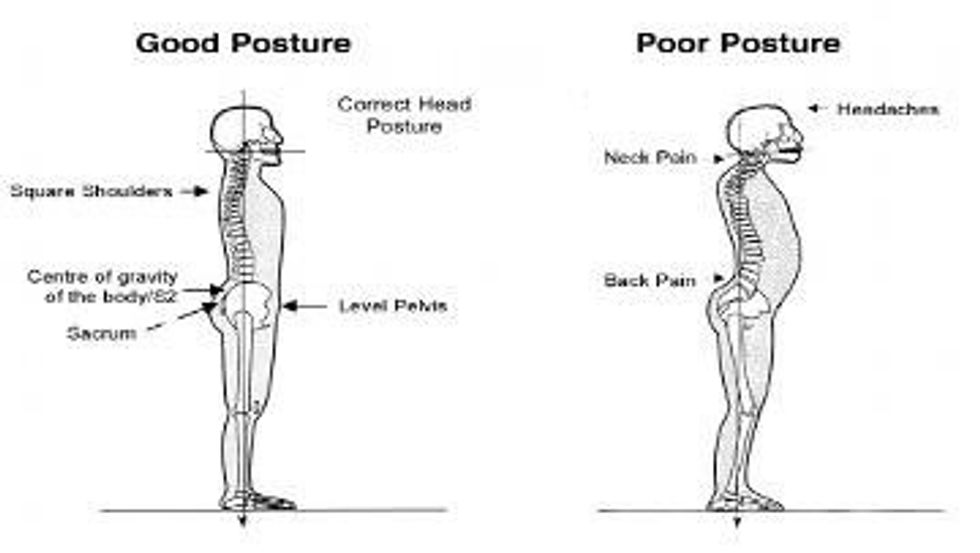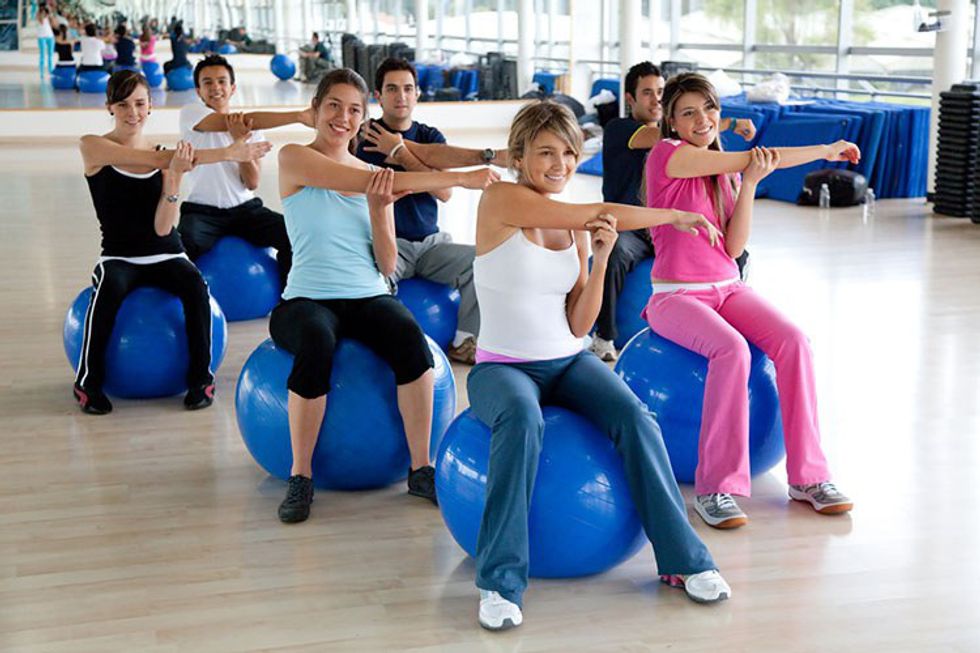I've written an entire article about it and have mentioned it briefly in most of the others: it's safe to say I enjoy talking about my new "healthy" lifestyle almost as much as I enjoy actually living it.
I recently read this article from Ravishly and it made me sad. It's about a woman who wanted to alleviate some of the physical problems being exacerbated by her weight, and the weight loss that ensued left her outcast by the fat acceptance community that once welcomed her. Damn, people, she just wanted to stop having sore ankles.
Face it: weight loss may be a side effect of healthy diet and regular exercise. But I do believe the fat acceptance community does get this right: weight loss should not be the ultimate goal when making a lifestyle change. Weight loss in and of itself is not inherently healthy - not everyone is naturally supposed to look like runway models, and our society's obsession with thinness is just as unhealthy as some of the diseases that often go hand in hand with obesity.
I'm not participating in Les Mills exercise classes at the Y five days a week, drinking at least 88 oz of water daily, or counting my macros because I want to see the number on the scale drop or fit into smaller clothes (I've actually gained 15 pounds and gone up a shirt size in the past two years). In fact, I've seen plenty of results from doing these things that have nothing to do with weight loss or even weight management.
Now, I'm not saying everyone should cut out all indulgences and start training for a marathon. I don't even do that; I love eating chocolate frosting out of the container and I hate running. But here are 11 things my lifestyle is doing for me - and may do for you:
1. Stabilizes Mood
Multiple studies have shown that active people are less likely to be depressed or anxious, according to the American Psychological Association - that may be because endorphins and other "feel-good" chemicals are released by your body during and after physical activity. In addition, diet and mood are also linked - eating foods rich in B-vitamins, vitamin D, omega-3s and "good carbs" such as the ones found in whole grains help alleviate depressive symptoms.
In January of this year, I'm pretty sure I cried every other day, and when I wasn't crying I was usually angry or stressed. I added more protein to my diet and ate more dark green veggies and whole grains starting in February, began lifting in March and added cardio to my workout routine in April. Once the combination really kicked in, the mood swings disappeared.
2. Improves Posture
Poor posture can lead to an array of problems, beginning with neck and back pain and possibly leading to health conditions such as degenerative disc disease. Unfortunately, most of my jobs have consisted of sitting at a desk for 40 hours a week, and while employers have made the efforts to provide ergonomic chairs, keyboards and desks, it's not always enough. WebMD suggests yoga, Pilates and other core-strength exercises to correct issues with your posture.
I remember complaining about back pain to my coworkers last winter, and they told me I was too young to be experiencing that kind of discomfort. After I started doing 30 minutes of core exercises twice weekly, the back pain disappeared and I could also sit and stand straighter.
3. Prevents Disease
It's no secret that healthy diet and regular exercise can prevent heart disease and diabetes. But certain foods may also prevent cancer - these 10 foods are high in antioxidants, omega-3s and other nutrients that are suggested to reduce the risk of cancer all over the body.
Diet and exercise may also prevent osteoporosis - adding foods rich in calcium and vitamin D helps keep bones strong. And the same exercises that improve posture can also help prevent the disease.
Type 2 diabetes, colon cancer and osteoporosis have been diagnosed in multiple members of my extended family, so my parents made sure I developed healthy eating habits from a young age in an attempt to prevent these and other chronic health conditions.
4. Heightens Mental Clarity
Diet can help ease memory problems, but adding exercise into the mix compounds these effects. Studies have suggested that exercise led to better performance in school and even slowed progression of age-related brain disorders such as Alzheimer's and Parkinson's.
I often had trouble focusing when I was in college; my insanely short attention span caused me to take hours longer than I should have on some homework assignments and I rarely did better than a C on exams. This focus issue continued into the workplace; I often felt like I couldn't think straight. But my mental energy improved only a week after I started working out regularly. I'm not alone - many of my friends were student-athletes, and they also noticed better grades during their sport's season.
5. Regulates Hormones
For me this may have been the biggest improvement. Most of my mood problems were caused by a hormone imbalance. My periods were irregular and the physical and emotional symptoms really took a toll on me. The mood swings worsened around my periods, and the intense headaches and stomachaches were becoming unbearable.
Uncomfortable period symptoms may be caused by a health condition such as polycystic ovarian syndrome (PCOS), endometriosis, or a thyroid disorder, but they have also been linked to diets low in protein, good fats, probiotics and antioxidants. After the tests for PCOS and thyroid conditions came back negative, that's when I really kicked my lifestyle into high gear. By summer, my periods were regular again and the PMS wasn't quite so excruciating.
6. Clears Your Skin
Not all acne is caused by diet, but consumption of these 7 foods correlate with breakouts. I cut back on dairy, sugar and white bread and noticed less of a problem with the acne that formed on my chin and jawline.
Proper hydration may also help reduce acne and aging signs on your skin, although this hasn't been proven - I noticed myself putting on less makeup once I started drinking more water. But drinking enough water helps with enough body woes that there is no reason not to do it.
7. Helps You Sleep Better
People who exercise regularly report sleeping well on most nights more often than those who don't. It has also been shown to help people with insomnia and sleep apnea. And, of course, getting a good night's sleep helps you stay alert during the day.
I not only had trouble concentrating during the day - I'd lay awake for hours trying to get to sleep at night and often would wake up multiple times during the night. But only a couple weeks into my exercise routine, I'd fall asleep more quickly and feel rested when my alarm went off in the morning. The exercise really took care of my "tired-all-the-time" feeling.
8. Saves You Money
People complain about healthy food being more expensive than junk food. This isn't entirely untrue, but it's not entirely true, either. For example, buying healthy food and cooking your own meals costs a lot less than going out to eat. And even when you do go out to eat, drinking water instead of soda or booze will save you a couple extra dollars and not put any sugar or "empty calories" into your system.
9. Can Provide a Support System
If you're anything like me, having a workout buddy makes going to the gym easier. One of my good friends from college encouraged me to join her at the YMCA for group exercise classes during our junior year at BCU. I enjoyed them then, but it wasn't until after college that I really found an appreciation for them.
I barely knew anyone in my city besides my boyfriend's family and his friend group and was often lonely and bored. But I remembered how much happiness my workout buddy from college got from group exercise, so this spring I forced myself to go to the classes at the YMCA network here. Now, not only do I experience all the other benefits of exercise, but my workouts have also become social events for me.
Other benefits include learning proper techniques, increased motivation and "forcing" you to schedule workout time, which will lead to achieving the other points in this article.
10. Improves Body Image
The mental health benefits that come with regular exercise may change your negative thoughts about your body into positive ones, and if you feel good, you'll look good too - confidence is said to be more attractive than conventional good looks.
For me, attending group exercise classes made me feel better about my body because of the variety of people who are there. Seeing other people who also don't have tiny waists or flat stomachs helped me come to peace with my own love handles and rectangular shape (hence the title of my other fitness article I wrote). I now catch myself checking out my reflection on a regular basis. Sorry, not sorry.
11. Creates a Positive Cycle
Once I started exercising regularly, I was able to listen more to my body's needs. I noticed cravings for fruits and vegetables instead of sugar and processed foods, and I paid attention to signs of dehydration that I once overlooked or mistook for hunger. In turn responding to these signals also increased my energy, strength and endurance. My nutrient-rich diet let to better performance which led to the desire for more of the nutritious food I was consuming. And this positive cycle helps sustain the other health goals I've achieved along the way.



























